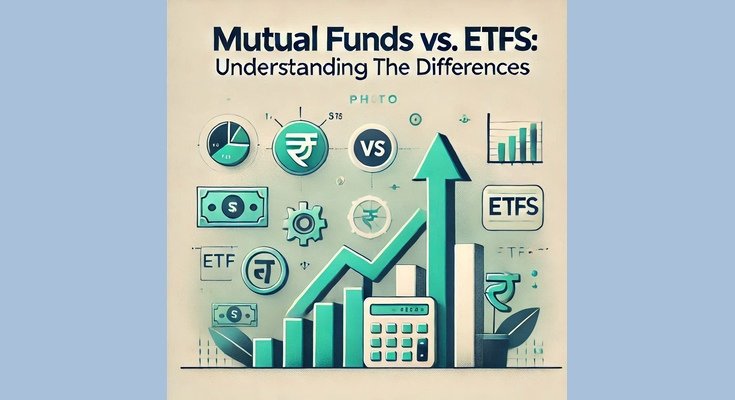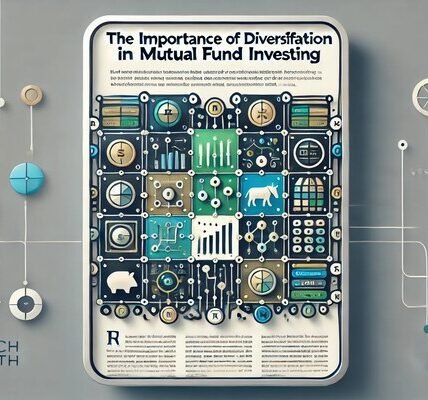
Mutual Funds vs. ETFs: Which One Should You Choose?
Investing is a powerful way to grow your wealth, but choosing the right investment vehicle can be challenging. Mutual Funds vs. ETFs is a common debate among investors, as both options provide diversification and professional management. However, they differ in structure, cost, and trading mechanisms, making them suitable for different investment goals.
This guide will help you understand Mutual Funds vs. ETFs, their advantages, disadvantages, and which one suits your financial objectives.
What Are Mutual Funds?
A mutual fund is a pooled investment where multiple investors contribute money, which is then managed by a professional fund manager. The fund invests in a diversified portfolio of stocks, bonds, or other assets.
Key Features of Mutual Funds
✅ Professionally Managed – Fund managers actively or passively handle the portfolio.
✅ Multiple Investment Options – Includes equity, debt, and hybrid funds.
✅ Liquidity – Investors can redeem units at the Net Asset Value (NAV).
✅ Investment Flexibility – Start investing with a Systematic Investment Plan (SIP) or a lump sum.
Example: The SBI Bluechip Fund, a popular equity mutual fund in India, focuses on large-cap stocks for stable returns.
What Are ETFs?
Exchange-Traded Funds (ETFs) are investment funds that trade on stock exchanges, similar to individual stocks. They aim to replicate the performance of a specific index, sector, or commodity.
Key Features of ETFs
✅ Traded Like Stocks – Buy or sell ETFs at any time during market hours.
✅ Low-Cost Investing – Lower expense ratios than mutual funds.
✅ Transparency – Holdings and performance are updated in real time.
✅ Index-Based Investing – Tracks indices like Nifty 50 or Sensex.
Example: The Nippon India ETF Nifty 50 replicates the Nifty 50 index, offering exposure to India’s top 50 companies.
Mutual Funds vs. ETFs: Key Differences
| Feature | Mutual Funds | ETFs |
|---|---|---|
| Structure | Actively/Passively managed pooled investment | Passively managed, index-tracking investment |
| Trading | Bought/sold at NAV, once per day | Traded throughout the day at market price |
| Expense Ratio | Higher due to active management | Lower due to passive management |
| Minimum Investment | SIPs start as low as ₹500 | Must buy in multiples of units (varies) |
| Liquidity | Redeemable directly from the fund house | Traded on stock exchanges |
| Transparency | Holdings disclosed periodically | Real-time updates on holdings |
| Demat Account | Not required | Required for trading ETFs |
Advantages of Mutual Funds (Mutual Funds vs. ETFs)
✔ Beginner-Friendly – No need for a demat account.
✔ Active Management – Fund managers aim to outperform the market.
✔ Diverse Investment Options – Equity, debt, and hybrid funds cater to all risk levels.
Example: A salaried professional investing in HDFC Balanced Advantage Fund can achieve a mix of equity and debt exposure.
Advantages of ETFs
✔ Low-Cost Investing – Lower expense ratios than mutual funds.
✔ Real-Time Trading – Flexibility to trade during market hours.
✔ Diversification – A single ETF offers exposure to an entire index or sector.
Example: A tech-savvy investor looking for sector-specific exposure might prefer ICICI Prudential IT ETF to invest in India’s booming tech industry.
Disadvantages of Mutual Funds
🚨 Higher Costs – Actively managed funds have higher fees.
🚨 Limited Control – Investors cannot decide specific holdings.
🚨 NAV Calculation – NAV is determined only at the end of the day.
Example: Reliance Small Cap Fund may charge higher fees than an equivalent ETF.
Disadvantages of ETFs
🚨 Requires a Demat Account – Adds setup and maintenance costs.
🚨 Market Fluctuations – Prices change throughout the day, leading to tracking errors.
🚨 Liquidity Issues – Some ETFs have low trading volumes, affecting price stability.
Example: The Bharat 22 ETF may experience liquidity issues during market downturns.
Mutual Funds vs. ETFs: Which Should You Choose?
Choose Mutual Funds If:
✅ You are a beginner or prefer professional management.
✅ You want to invest systematically through SIPs.
✅ You prioritize long-term wealth creation over daily trading.
Example: Parents planning for their child’s education can invest in Axis Long Term Equity Fund (ELSS) for tax-saving and growth.
Choose ETFs If:
✅ You are an experienced investor seeking low-cost options.
✅ You already have a demat account.
✅ You prefer real-time trading flexibility and index exposure.
Example: A young professional looking to track the Nifty 50 index can invest in UTI Nifty ETF.
Taxation: Mutual Funds vs. ETFs
| Aspect | Mutual Funds | ETFs |
|---|---|---|
| Equity-Oriented Funds | STCG @ 15%, LTCG @ 10% (above ₹1 lakh) | Same as mutual funds |
| Debt-Oriented Funds | STCG taxed as per slab, LTCG @ 20% with indexation | Same as mutual funds |
Example: If you redeem units of Kotak Standard Multicap Fund or an equivalent ETF, the same tax rules apply.
Mutual Funds vs. ETFs in the Indian Context
In India, mutual funds remain more popular among retail investors due to ease of access and SIP options. However, ETFs are gaining traction as low-cost alternatives, especially among young, tech-savvy investors.
📈 Interesting Fact: In 2023, India’s ETF market experienced a surge in Assets Under Management (AUM), indicating growing interest in passive investing.
Conclusion: Mutual Funds vs. ETFs – What’s Right for You?
Both mutual funds and ETFs have unique benefits. The choice depends on your investment goals, risk appetite, and market knowledge.
✔ Mutual Funds are ideal for beginners and those who want professional management.
✔ ETFs are suitable for cost-conscious investors comfortable with direct trading.
💡 Pro Tip: A smart strategy is to diversify your portfolio by combining mutual funds and ETFs, balancing active and passive investment approaches.
By understanding Mutual Funds vs. ETFs, you can make well-informed financial decisions, ensuring long-term wealth creation.
Start Your Investment Journey Today!
For expert financial insights, visit Rich Path. and start your investment journey today! 🚀
Read more –
Top 5 Mutual Funds for Long-Term Growth in India in 2025
Best Mutual Funds: How to Choose – A Complete Guide
Best Flexi Cap Mutual Funds to Invest in 2025
Disclaimer
This article is for educational purposes only and should not be considered financial advice. Investments in mutual funds and ETFs are subject to market risks. Always consult a certified financial advisor before making investment decisions.



